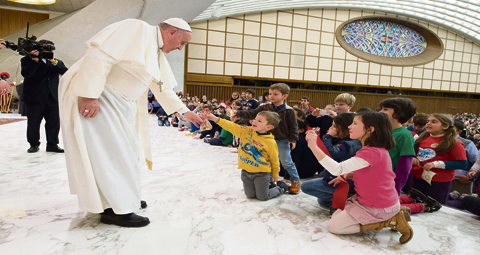April 10 | ![]() 0 COMMENTS
0 COMMENTS ![]() print
print

We must keep the Faith in the family
Be politically aware and active, but ultimately leave differences aside and listen to the Gospel as one, advises Cath Doherty
As politicians take centre stage in preparation for the coming election, depression must settle over most people like a cloud of dust. As political parties brandish meaningless manifestos and strut their predictable, stage-managed stuff in the hope of gaining votes, we all know that the end result will be ‘more of the same’ with large measures of social engineering thrown into the mixture.
We live in dangerous times, where the state seeks to control an ever-increasing part of our lives, where the family, the very cornerstone of our society is being undermined. ‘Faith and Family’ for us, as Catholics, these two things merged into one, is a strength which carries us forward. And as we, with other dominations, face an increasingly secular society with its incursion into our religious beliefs, our spiritual lives, we might do well to take a closer look at one aspect of the social engineering which has brought us dangerously close to state control of the Family.
Today, only one mother in ten stays at home to raise children. The percentage of women with dependent children who now go out to work has overtaken the number of working women who have no dependent children. There has been a marked rise in working mothers of children under the age of five in recent years. Official figures now show the proportion of mothers who stay at home has dropped by more than a third over the past two decades to an all-time low. We all know that statistics can lie and that opinion polls can be of little value, but nonetheless it is interesting to note that a recent survey shows that one in three working mothers would prefer to stay at home and raise her family.
We have travelled a fair distance from the days when there were worries about ‘latchkey kids’ who arrived from school before their mothers got home from work, and even further distance from a national census in the late 19th Century which revealed that 12-year-old children who had been given exemption from school were noted as a ‘mothers help.’
And behind the trumpeting of successive governments about ‘getting women back to work’ lies the real reason for it. Increased tax revenue. Despite financial inducements offered to mothers, such as free childcare, tax credits or the like, there is financial advantage at the end of it all for the government of the day. That quotation about the price of everything and the value of nothing comes to mind. Inherent in it all is the danger of loss of family structure and strength.
State intervention and social engineering are also posing threats. Following on from proposed guardianship for every child in Scotland are yet another set of proposals from NHS Health Scotland for Government-run parenting courses, child development courses for underprivileged children from the age of twelve months upwards, clearance for official visits to family homes to check on availability of suitable toys and books for underprivileged children. Are lines blurred here, as they are with ‘social inclusions’ in schools?
Campaign groups are already forming up to oppose this state intervention. Perhaps the state has at last taken a step too far with its social engineering. It has, at least, promoted an organised response to intrusion on the rights of parents to rear their own children.
And in this age of technology, it is interesting to know that the Scottish Government has spent more than half a million pounds advertising on social media in the past three years and has no fewer than 56 twitter accounts. Why? The answer’s obvious…
Moving to the once strong triangle composed of church, school and family, we find another weakening. That triangle has lost strength in recent years. Faced with falling attendances at Mass, church closures, is it time to lament our loss or to turn and make an attempt to regain lost ground? Will the promised consultation process on the subject of parish closures leave room for constructive discussion, positive input by the Faithful?
I hope that it does, because that would yield positive ideas, activate real efforts to find lasting solutions to our problems. We need open meetings where all the generations gather, a place where views can be expressed as well as ideas offered, inspirational speakers who will spark off constructive discussion.
Today, the Faith seems to be mired in sub-divisions… conservative and liberal clergy, differing approaches to the Liturgy and church music, age groupings and so on. The message of the Gospel is clear, unequivocal. We need to leave differences aside and listen to it as one.
And, while it is recognised that our Catholic education is in good hands, we should really look again at the detail of what has been called ‘the Cinderella subject’… namely RE in our secondary schools. If it is integrated with the practical work of a school’s ‘parent parish,’ it will benefit all concerned… another strengthening of the triangle I mentioned earlier.
There is no time to lose. While politicians set out their stalls and seek our votes and the power to intrude on our lives we need to talk openly with one another, with our spiritual leaders. That would be a step in the right direction.
Recently, I have caught sight of a family who have taken that step. Parents, a teenage son and two little daughters, they quietly go about their self appointed tasks together, as a family. Passkeeping duties, providing teas and coffees after Mass, tending alter flowers, completing church decoration at Christmas… where there is a need, they quietly give their services. Parents teaching by example, children being brought up in the faith, unobtrusive, constant in their offerings. Faith and family united, a strength now and for the future. And within it lies an idea for the way forward.
One line of a hymn has just popped in to my head as write this.
“Now the green blade riseth…”
A metaphor for Eastertide and a new beginning.
—What do you think of CATH DOHERTY’S comments on faith and family? Send your points of view to the SCO. Write to Letters, SCO, 19 Waterloo St, Glasgow G2 6BT or e-mail [email protected]
— The views expressed in the opinion section of the SCO are those of informed individuals and groups and not necessarily those of the newspaper or the Church










